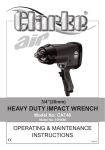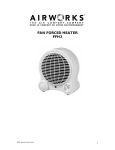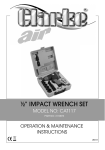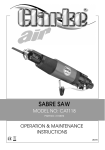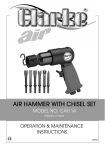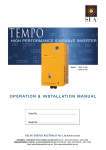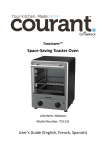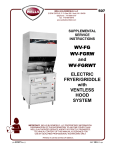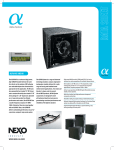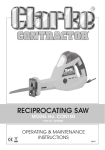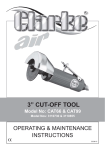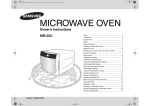Download Clarke CAG122 Specifications
Transcript
4½” Angle Grinder Model CAG122 Part Number 6470127 Operating & Maintenance Instructions © 0111 Specifications Model No ................................................................. CAG 122 Part No ..................................................................... 6470127 Supply Voltage ........................................................ 230 V AC, 50 Hz, 1 Phase Motor input wattage .............................................. 900Watts Fuse Rating ............................................................... 13A Insulation Class ........................................................ II (Double Insulated) No Load Speed ....................................................... 10,000 RPM Sound Pressure level ............................................... 89.7 dB(A) Vibration Level (see P 12) ....................................... 13.2m/s2 Maximum Cutting Wheel Diameter ..................... 115mm Cutting Wheel Bore ................................................. 22mm Drive Spindle Thread ............................................... M14 Tool Weight .............................................................. 2.3kg If you have any problems using or setting up your Grinder call the Clarke Helpline on : j 020 8988 7400 Press 1 for Parts : 2 for Technical Assistance Do not dispose of this product with general household waste. It must be disposed of according to all laws governing the disposal electrical and electronic waste, at a proper disposal facility. -2- Contents Specifications ............................................................................................. 2 Guarantee .................................................................................................. 3 Features and Use ....................................................................................... 3 For your Own Safety ................................................................................... 4 General Safety Precautions : For Power Tools ........................................ 4 Safety Precautions : For Angle Grinders .................................................. 5 Electrical Connections .............................................................................. 6 Overview of your Angle Grinder .............................................................. 7 Mounting the Grinding Wheel / Cutting Disk .......................................... 8 Maintenance .............................................................................................. 9 Troubleshooting ......................................................................................... 10 Parts and Service Contacts ..................................................................... 10 Spare Parts Diagram ................................................................................. 11 Spare Parts List ........................................................................................... 11 Recommended Grinding Wheels / Cutting Disks .................................. 11 Vibration Emissions .................................................................................... 12 Thank you for purchasing this Clarke Angle Grinder. Before using please read these instructions. This is for your own safety and that of others around you, and to help you achieve long and trouble free service from the Grinder. Guarantee This product is guaranteed against faults in manufacture for 12 months from purchase date. Keep your receipt as proof of purchase. This guarantee is invalid if the product has been abused or tampered with in any way, or not used for the purpose for which it is intended. The reason for return must be clearly stated. This guarantee does not affect your statutory rights. Features and Use This Angle Grinder is a hand held power tool that uses abrasive disks to grind metals or masonry. It is intended for D.I.Y and light commercial use only. The grinder features a moveable guard, a spindle lock and a safety ON/OFF switch. -3- For Your Own Safety WARNING: As with all machinery, there are certain hazards involved with their operation and use. Exercising respect and caution will considerably lessen the risk of personal injury. However, if normal safety precautions are overlooked or ignored, personal injury to the operator or damage to property, may result. Keep children away when using Power Tools. Eye protection manufactured to the current European Safety Standard should be worn when using Power Tools. General Safety Precautions : For Power Tools Always check for damage before using the tool. Any damaged part should be checked to ensure that it will operate properly and perform its intended function. Check for alignment of moving parts, breakage of parts, mountings and any other condition that may affect the tools’ operation. Any damage should be properly repaired or the part replaced before the tool is used. Always keep work area clean and clear. Cluttered areas and benches invite accidents. Always wear proper apparel. Loose clothing or jewellery may get caught in moving parts. Wear protective hair covering to contain long hair. Always handle equipment with care. If in doubt Do Not use the tool. Consult your Do Not carry the tool by its’ electric cable, or yank the cable to disconnect it from the local dealer. power supply. Always ensure that adequate lighting is Always ensure the switch is OFF before available. A minimum intensity of 300 lux should be provided. Ensure that lighting is plugging in to mains. This will ensure the placed so that you will not be working in your equipment does not start accidentally. own shadow. Always follow the maintenance instructions. Always wear safety goggles Keep tools clean and maintained for the manufactured to the latest European Safety best and safest performance. Standards, everyday eyeglasses do not have Never force the tool. It will do a better impact resistant lenses, they are NOT safety and safer job at the rate for which it was glasses. designed. Always use a face or dust mask if Never operate equipment while under operation is particularly dusty. the influence of Drugs, Alcohol or any Always disconnect the tool from the Medication. power supply before servicing and when Do Not overreach. Keep your proper changing accessories. footing/balance at all times. For best footing Always use in a suitable environment. wear rubber soled footwear. Keep floor clear Don’t use power tools in damp or wet of oil, scrap wood, etc. locations or expose them to rain. Keep your Only Use recommended accessories. work area well illuminated. Do Not use in The use of improper accessories could be explosive atmosphere. (i.e near flammable liquids etc.). hazardous -4- Additional Safety Precautions : For Angle Grinders Eye Protection manufactured to the current European Safety Standard should be worn when operating grinding equipment. Ear Protection manufactured to the current European Safety Standard should be worn when operating grinding equipment. worn A Dust Mask manufactured to the current European Safety Standard should be when operating grinding equipment. WARNING ! Ensure all accessories used are rated at the spindle speed, or higher. WARNING ! Never press the spindle lock while the disc is rotating. Always wear a good pair of industrial Never use excessive force. It should only gloves to avoid potential injury from sparks be necessary to use a little more than the weight of the tool. If the rotational speed and debris. drops abnormally, reduce pressure Always keep the mains cable well away immediately. Forcing the tool and excessive from the tool. Ensure an adequate electrical pressure can cause dangerous disc supply is close at hand so that the operation is breakage and/or damage to the tool. not restricted by the length of the cable. Never allow the ventilation slots in the Always switch the tool OFF immediately tool to become blocked. when the task is completed. Never use the tool with the guard Always ensure the grinding wheel or removed. If the guard becomes damaged, cutting disc is fully tightened before use. it must be replaced Always ensure the wheel / disc is not Never use the tool in a confined space touching the work when switching ON. which may limit body movement. Always allow the Grinder to run briefly Use only wheels/discs designed for their before using. Check for vibration which could specific function. (see page 11) indicate poor balance or installation of the Beware of flying sparks. Hold the grinder wheel/disc. at an angle of 15 - 30 O to the workpiece Always hold the tool firmly in BOTH hands surface (as shown in figure (2)). (as shown in figure (1)). (1) (2) 15 - 30O -5- Electrical Connections Double Insulated Electrical Appliance This appliance is of Double Insulation Construction. Because of its construction there is no earth required and therefore there is no Earth connection. Connect the mains lead to a standard 230V (50Hz) electrical supply through an approved 13 Amp BS1363 plug, or a suitably fused isolator switch. The two wires in the mains lead should be wired up in accordance with the following colour code: IMPORTANT : The wires in the mains lead are coloured in accordance with the following code: Blue - Neutral Brown - Live As the colours of the flexible cord of this appliance may not correspond with the coloured markings identifying terminals in your plug proceed as follows: Connect BROWN coloured cord to plug terminal marked with a letter L or coloured RED Connect BLUE coloured cord to plug terminal marked with a letter N or coloured Black IMPORTANT: If this appliance is fitted with a plug which is moulded on to the electric cable (i.e. non- re-wireable) please note: 1. The plug must be thrown away if it is cut from the electric cable. There is a danger of electric shock if it is subsequently inserted into a socket outlet. 2. Never use the plug without the fuse cover fitted. 3. Should you wish to replace a detachable fuse carrier, ensure that the correct replacement is used (as indicated by marking or colour code). 4. Replacement fuse covers can be obtained from your local dealer or most electrical stockists. 5. The fuse in the plug must be replaced with one of the same rating (13 amps) and this replacement must be ASTA approved to BS1362. IMPORTANT: If in any doubt, do not attempt any electrical repair yourself. Consult a qualified technician -6- Figure (1) Overview 6 2 1 5 4 3 1 Safety ON/OFF Switch 4 Handle 2 Spindle Lock Button 5 Abrasive Disk 3 Moveable Blade Guard 6 Body Before Using the Grinder Fit the Handle : Screw the handle (4) into the appropriate position in the grinder head as required. Figure.1a Adjusting the Guard Adjust the Guard : The guard (3) needs to be adjusted to give maximum protection from sparks and debris produced when grinding. This must be done before mounting the wheel/disk. Slacken the four screws, arrowed in Fig 1a by half a turn only, sufficiently for the guard to be rotated to its desired position. When satisfied, tighten all four screws securely. Mount the Grinding Wheel / Cutting Disc : See page 8 for details Connecting to the Power Supply : Connect to the power supply using a Residual Current Device. Do not use in wet or damp conditions. WARNING ! Ensure that the power supply is disconnected before adjusting the guard or mounting the handle. -7- (i) Mounting the Grinding Wheel / Cutting Disc 1 Unscrew and remove the outer flange : Lock the spindle by pressing the spindle lock button and use the tool supplied to turn the flange and break the seal. It may then be screwed off by hand. 2 Mount the Grinding Wheel, as shown in Figure 2. The grinding wheel supplied is a ‘Depressed Centre’ type. Mount with the depressed centre towards the motor. 3 Screw on the Outer Flange with the raised boss facing inwards, ensuring the wheel or disk sits snugly over the raised boss on the inner flange. Tighten the flange using the tool provided, locking the spindle by pressing the spindle lock button, and taking care to ensure the wheel is still sitting snugly, centred over the flange bosses. Do not overtighten the outer flange. Figure (2) Mounting Discs IMPORTANT ! Fig (2) shows the set up for a grinding wheel. WHEN ATTACHING A CUTTING DISC YOU MUST REVERSE THE OUTER FLANGE Using the Grinder IMPORTANT! DO NOT plug the tool in to the mains, unless you have ensured it is switched OFF and the guard is set to the desired position. Hold the Grinder firmly in both hands. The hand holding the body will control the ON/ OFF switch, whilst the other hand grasps the handle and guides the tool over the workpiece. Hold at 15 - 300 from the workpiece. To Start the Motor push the switch fully forwards. To Stop the Motor press down on the rear of the switch. Allow the tool to do the work, do not force the wheel on to the workpiece. IMPORTANT! BE AWARE at all times, the tool can be very dangerous if not used properly -8- Maintenance IMPORTANT! Ensure that the grinder is disconnected from the power supply before carrying out any maintenance. Before Each Use Always inspect the tool before use, and ensure it is in top condition. Ensure all air vents are clear, use compressed air to clean the tool where possible. (Always wear protective goggles when cleaning with compressed air). Check the power cable to ensure it is sound and not damaged in any way. Ensure the grinding wheel or cutting disc is perfectly sound and free from cracks or damage in any way. After Every 50 Hours of use After every 50 hours of use the motors’ carbon brushes need to be checked and renewed if necessary. You will need a cross head screwdriver and a small flat head screwdriver. The brushes are changed as follows : 1 Unscrew the casing screw (A) and pull the casing away from the body by sliding casing down the power lead to give access to motor brushes. A 2 Remove the brush assembly by unclipping with a flat head screwdriver. (B) 3 If the brush is worn (less than 6mm remains, see (C)) then replace the brush assembly by clipping a new one into place (D). Replace the casing and secure with the casing screw taking care not to damage the lead. B Casing Screw C D -9- Troubleshooting Problem Possible Cause Tool will not operate 1. No supply 1. Check supply and rectify where necessary. 2. Switch is faulty 2. Consult your Clarke dealer 3. Brushes badly worn 3. Check and replace if necessary 4. Fuse blown 4. Check and replace if necessary If condition persists, consult your dealer 5. Motor faulty 5. Consult your Clarke dealer. Motor runs but disc 1. Flange nut not tight 1. Tighten flange nut does not turn 2. Gear shaft or key broken 2. Consult your Clarke dealer Heavy internal 1. Faulty motor 1. Consult your Clarke dealer sparking 2. Badly worn brushes 2. Renew brushes (see p.8) Motor gets hot 1. Work load too heavy 1. Reduce force applied to tool 2. Low supply voltage 2. Ensure supply voltage is correct. If extension cable is used, ensure it is of the correct value, and is fully unreeled 1. Disc not mounted correctly or is damaged 1. Check and rectify 2. Bearings worn 2. Consult your Clarke dealer Excessive vibration Repair Parts and Service For Spare Parts and Servicing, please contact your local dealer, or Clarke International on one of the following Numbers: Parts and Service Tel: 020 89887400 Parts and Service Fax: 020 85583622 or email as follows: Parts: [email protected] Service: [email protected] - 10 - Spare Parts Diagram (Figure 3) Spare Parts List No. Part No. Description 1 Motor Brush KP12201 2 Handle KP12202 3 Wheel/Disk Guard KP12203 4 Inner Flange KP12204 5 Outer Flange K{12205 6 Grinding Wheel / Cutting Disc ( See Clarke Accessories below ) 7 Flange Tool KP12207 8 Casing KP12208 Recommended Grinding Wheels / Cutting Discs Clarke Accessories Description Part No. Dia Thickness 1 Metal Grinding (DPC) 6470705 115mm 6mm 2 Metal Cutting (DPC) 6470775 115mm 3mm 3 Masonry Cutting (DPC) 6470735 115mm 3mm - 11 - VIBRATION EMISSIONS HAND-ARM VIBRATION Employers are advised to refer to the HSE publication “Guide for Employers”. All hand held power tools vibrate to some extent, and this vibration is transmitted to the operator via the handle, or hand used to steady the tool. Vibration from about 2 to 1500 herz is potentially damaging and is most hazardous in the range from about 5 to 20 herz. Operators who are regularly exposed to vibration may suffer from Hand Arm Vibration Syndrome (HAVS), which includes ‘dead hand’, ‘dead finger’, and ‘white finger’. These are painful conditions and are widespread in industries where vibrating tools are used. The health risk depends upon the vibration level and the length of time of exposure to it……in effect, a daily vibration dose. Tools are tested using specialised equipment, to approximate the vibration level generated under normal, acceptable operating conditions for the tool in question. For example, a grinder used at 45° on mild steel plate, or a sander on soft wood in a horizontal plane etc. These tests produce a value ‘a’, expressed in metres per second per second, which represents the average vibration level of all tests taken, in three axes where necessary. MODEL No: CAG122 DESCRIPTION: ANGLE GRINDER Declared vibration emission value in accordance with EN12096 Measured vibration emission value - a: 13.2 m/s2 Value determined according to EN28622-1 ‘a’ values in excess of 2.5 m/s2 are considered hazardous when used for prolonged periods. A tool with a vibration value of 2.8 m/s2 may be used for up to 8 hours (cumulative) per day, whereas a tool with a value of 11.2 m/s2 may be used for ½ hour per day only. - 12 - The graph below shows the vibration value against the maximum time the respective tool may be used, per day. It should be noted that if a tool is used under abnormal, or unusual conditions, then the vibration level could possibly increase significantly. Users must always take this into account and make their own risk assessment, using the graph above as a reference. Some tools with a high vibration value, such as impact wrenches, are generally used for a few seconds at a time, therefore the cumulative time may only be in the order of a few minutes per day. Nevertheless, the cumulative effect, particularly when added to that of other hand held power tools that may be used, must always be taken into account when the total daily dose rate is determined. - 13 - DECLARATION OF CONFORMITY - 15 - NOTES
















